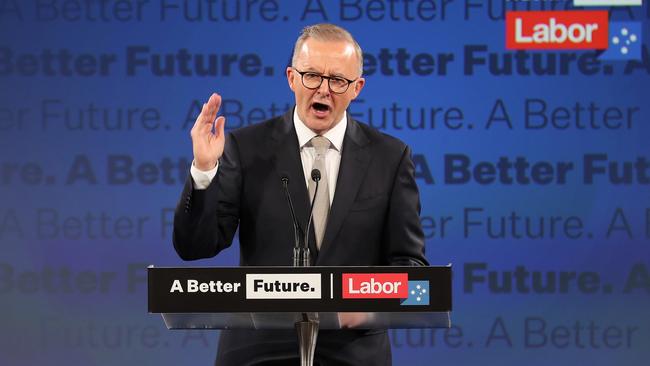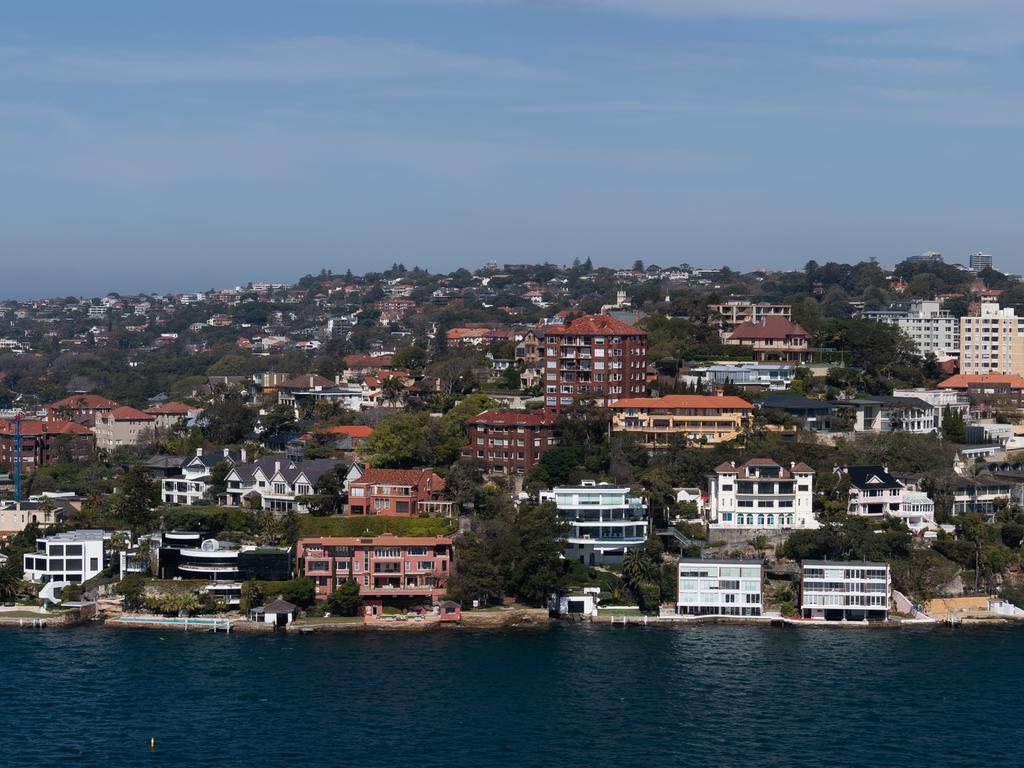Federal election 2022: Winning the spin on economic management

“Smirk and mirrors” was how Labor leader Anthony Albanese described Scott Morrison’s modus operandi at the Labor launch on Sunday in Perth. But there is plenty of smoke and mirrors on both sides.
After Albanese’s excruciating moment in week one of the campaign where he knew neither the unemployment rate nor the Reserve Bank’s cash rate, what stood out in Sunday’s speech is that he made no reference to the imminent rates meeting of the RBA. On Tuesday the bank may indeed lift the cash rate from 0.1 per cent, kicking off a march upwards in rates for Australians.
Over in the east on Sunday morning both the Prime Minister in western Sydney and the Treasurer at his local campaign launch in Kooyong were asking their audiences to tell them the unemployment rate. “Anyone who says 5 per cent — well congratulations, you can be leader of the Labor party,” said Josh Frydenberg.
There is subtle spin too.
Frydenberg knew exactly what he was doing on Thursday when he reminded RBA governor Phillip Lowe that he had previously planned to wait to see wages growth and labour cost figures before moving on rates.
Labor has cried foul that this a Treasurer putting direct pressure on the RBA. It is not that. What it is, however, is an attempt to be seen to be pressuring the RBA – a calculated signal to Australians that the government is doing all it can to delay a rate rise.
Governor Lowe is quite capable of making his own independent decision, which will certainly take into account Wednesday’s shock annual inflation figure of 5.1 per cent. The board will need to think hard how to justify another month of sitting on its hands.
If the RBA does decide on an election campaign rate rise, the public will be bowled up with two classic spinners.
The Morrison and Frydenberg pitch is that only they as seasoned economic managers who brought the country through Covid have the ticker to handle the largely external forces plaguing Australia – a supply chain crisis, low wage growth and runaway inflation overseas. The economic news may be bad, and it may get worse, but that is why Australia needs the Coalition in charge.
The Labor pitch honed by shadow Treasurer Jim Chalmers while Albanese was in Covid isolation is that the government has racked up $1 trillion of debt and landed Australians with a triple whammy of wages going backwards in real terms, cost of living going through the roof and impending rate rises.
In his Sunday address Albanese rode high on Labor’s track record as the party of economic reform: the Accord, Medicare and universal super under Hawke and Keating, the NBN under Rudd, and the NDIS under Gillard. Labor, he said, understood that these programs drove a strong economy and boosted productivity and participation.
“Labor has real lasting plans for better electricity, cheaper childcare, cheaper mortgages, cheaper medicines and Medicare and for better pay. Are we going to tackle rising costs and flat wages? Are we going to embark on a new era of economic reform with productivity growth at its centre?” he said.
But Labor does not offer a serious reform agenda. Neither the Coalition nor Labor have appetite for reform. Taking reforms to an election as Labor did and as John Howard did with the GST requires leadership and rational argument on pain for gain. Both sides say they will grow the economic pie and increase productivity. Both sides say there will be no new taxes.
Yet neither side wants to talk seriously about immigration, even skilled migration, during the election despite businesses crying out for workers. And why? Skilled workers bring productivity gains but in the short term could well depress wage growth.
It is straightforward for Labor to blame the government for the state we are in – skyrocketing cost of living and falling wages. For Morrison and Frydenberg to demolish the credibility of Labor promises in the eyes of ordinary Australians may be harder.
Labor’s solution for the economy is taxing big fat multinational companies, cheaper cleaner energy, more affordable childcare and more skills training.
The electorate has been sold the line that billions in taxes can be clawed out of multinationals by both Labor and the Coalition over several elections now.
This does not pass the pub test.
Labor’s commitment of a $275 per annum drop in household electricity bills by 2025 looks ever more shrill, with last week’s warning from AEMO on wholesale prices.
Childcare is a touchstone issue but not one that can deliver wage rises overnight from productivity gains. How far will Labor go to convince voters that wages will rise, with or without increased productivity, needs to be tested. And just who promises to do more on skills training is a muddied message in the electorate.
Meanwhile, as interest rates rise, servicing the government’s $1 trillion of debt racked up during the pandemic will only get more difficult. Debt and deficit is at the heart of sound economic management but that line has long been ditched by the Coalition.
There will be finger pointing from both sides on the credulity of campaign costings but Labor has no interest in addressing cost blowouts like the NDIS. There were tinges of Mediscare in Albanese’s speech.
Sitting in the front row on Sunday was former prime minister and economic reformer Paul Keating.
Thirty-two years ago Keating famously told the people: “This is a recession Australia had to have.” He had then been treasurer for some eight years, and was at the time very much the superior economic manager.
Forces outside Australia were also to blame then: international recession set in and high interest rates were applied to control a runaway asset boom of the 80s. As luck would have it Labor had only just won office. There was no contest in a campaign.
Scott Morrison may not be popping up in Teal seats but his stamina will become more and more of an X-factor everywhere else as the campaign drags on.
It may be smirk and mirrors but remember the “real” Julia Gillard?
Anthony Albanese may be back on the campaign trail but Labor’s issue is still that many ordinary Australians know little about Albo, real or otherwise.






The victor in Australia’s cost-of-living election will be the side that spins best on economic credibility. Not who is actually the better economic manager, but who is the better spinner on being the better economic manager – spin that cuts through in the electorate.